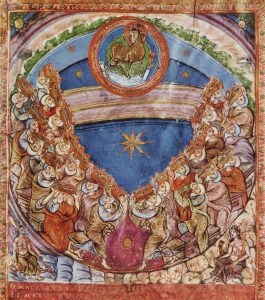 Revelation 2:17: “The one who has an ear let him hear what the Spirit is saying to the churches. To the one who conquers, I will give him some of the hidden manna and I will give him a white stone, and upon the stone a new name is written, which no one knows except the one who receives it.”
Revelation 2:17: “The one who has an ear let him hear what the Spirit is saying to the churches. To the one who conquers, I will give him some of the hidden manna and I will give him a white stone, and upon the stone a new name is written, which no one knows except the one who receives it.”
The Pergamum letter closes with an interesting promise to the conquerors. Jesus promises them the “hidden manna” and a stone with a “new name.” Interpreters have struggled to figure out what these two promises refer to. This shows that Jesus has accomplished the desired effect of his words. The Nicolaitans are apparently claiming to teach “deep things,” which Jesus is about to label “deep things of Satan” (2:24). Thus, they are apparently offering secret knowledge and perhaps secret benefits that flow from that knowledge. Jesus counters by promising rewards to his faithful ones that are hidden and mysterious, but definitely better than the judgment that awaits all of the Nicolaitans and their teachers.
What is the Hidden Manna?
The first mysterious reward is the “hidden manna” (2:17). Like the “tree of life” (2:7), the “hidden manna” is probably a typological image that has to do with the blessings of the New Jerusalem. Manna is a familiar image from the Old Testament. It is the “bread from heaven” that God provided for Israel in the wilderness (Exod. 16:4), which Jesus also speaks about in John 6. In Numbers 25:1-2, manna is what Israel should have been eating instead of the meat sacrificed to idols, which the Moabite women invited them to eat. Thus, Jesus promises to his people who abstain from pagan feasts and meat sacrificed to idols that he has prepared “hidden manna” for them to eat (see Rev. 2:14). The manna that he will give to his people is hidden now, but it will be revealed in the New Jerusalem. The new manna is better than the old, since the gift of manna is probably analogous to the former promises of the tree of life and freedom from the second death (2:7, 11). The old manna did not give eternal life (John 6:58), but those who eat some of the new manna will live forever.
Solving the Riddle of the Stone with the New Name
The second reward is more mysterious. The “white stone” is the writing surface for the “new name” (Rev. 2:17). White is an appropriate color, because it is the color of the robes of the purified and triumphant people of the Lamb (7:14). A stone is a good place to inscribe a lasting message, which is a practice that we still follow today. On the white stone, Christ has written a “new name,” “which no one knows except the one who receives it” (2:17). The new name is either the new name of Christ or a new name that Christ assigns to each believer in light of the new person that he becomes in the New Jerusalem. The first seems more likely, because the faithful at Pergamum and Philadelphia are given credit for holding on to Jesus’ name (2:13; 3:8). Jesus’ promise to Philadelphia is to write on the victor “my new name” (3:12). Revelation 19:12 is helpful as well, because it mentions a name written on Jesus, “which no one knows except himself.” Consequently, Jesus’ new name is now hidden to everyone except himself. He will reveal it to each one of his people in the New Jerusalem. In biblical theology, names for God and for his chosen servants reveal something important about their identity. Thus, when Jesus promises to reveal his secret name, he is promising a fuller and more complete revelation of himself to the people of the New Jerusalem. Like the hidden manna that gives eternal life, the new name is a lasting reward that will never fade away.
Sources:
These paragraphs are slightly edited portions of my book:
Paul Hoskins, The Book of Revelation: A Theological and Exegetical Commentary, pp. 90-92 (those pages provide further sources and footnotes that I have omitted above).
